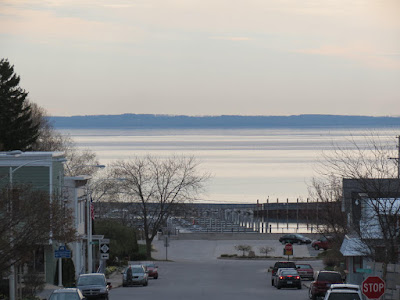 |
| Before the leaves, before the boats |
Some
thoughts are like perennial itches: you can scratch and scratch away at them
for years, and they never go away. One such thought, for me, is that of the
common good, a venerable idea in Western philosophy but seemingly in decline in
our day.
For
instance, the original idea of public schools in the United States of America
was that it is for the public good that all citizens of a republic be educated.
Self-government demands general education for all. (The words chiseled over the proscenium of
my high school auditorium were from Diogenes: “The Education of Every State is
the Education of Its Youth.”) In the current American climate, parents are much
more likely to see education as something they want their children to have as a competitive
edge over other
kids in the country. In this new discussion, I don’t hear concern for the
future lives of those educated, successful children and their children in a
country of increasing inequality. If this sounds like an accusation, I suppose
it is, in part, but another important part is that I simply don’t understand. I
don’t understand wanting that kind of world. It isn’t what I want for my kids
and grandkids.
As
Leelanau County tackles the
difficult and thorny issue of affordable housing (see previous post), schools
are part of the discussion, but what is at stake in our little villages is not
keeping poor kids out of our public schools but keeping enough kids in school
to keep the schools open! What is a community without a school?
It’s
probably more than coincidence
that NPR last night had a feature on a proposed affordable housing
project in Marin County, California, since northern Michigan communities are
far from the only ones faced with the issue. (Interesting
that the headline reads “debate against [sic] affordable housing.” A debate presents opposing arguments,
not the arguments of a single side, and in fact the Californians in the story
fell onto both sides of the issue, not always on the basis of who was in the
boat and who was in the water.) On my way to Northport this morning, headed for
my little, 23-year-old, independent bookstore, a particular word in one Marin
County man’s complaint about the proposed project kept bouncing around in my
head, unable to settle in a comfortable resting place. The word was sacrifices.
“I made great sacrifices to be here,” he says. “I think it's selfish to expect that someone else should be able to acquire (it) for little or next to nothing.”
That’s
only a snippet, and it doesn’t tell me much, but I can’t help wondering what
the man means. I can
understand parents sacrificing for their children. I can understand soldiers
sacrificing for their country. But if I give up something to gain something I want
more, how is
that a sacrifice?
Isn’t it simply a question of priorities, of knowing what is most important to me? Isn't a sacrifice something given up?
What
of another household in which the homeowners’ inherited wealth enabled
them to buy into the neighborhood? They could not be said to have sacrificed,
could they? Do we want to say their parents made the sacrifices? Well, maybe
they did, and maybe they didn’t. Who knows? And how many generations back do we
want to go -- until we reach unscrupulous ancestors?
To
believe that everyone with wealth earned every single penny by the sheer sweat
of his or her own brow, with no help from anyone and no advantages of
upbringing, and that every poor person is poor merely because he or she does
not work hard is nothing but self-serving myth. No one has more than 24 hours a
day in which to live, and not all those hours can be devoted to work. Sleep has
to figure in. Do people with 100 times as much money work 100 times as many
hours a day? I’d say not.
Back to
my original thought-itch, that of the idea of the common good? What is it? A
Santa Clara University site defines it as “social systems, institutions and
environments on which we all depend” working in such a way as to “benefit all
people,” which would surely include public safety, schools, and conservation of
natural resources, at a minimum. The Santa Clara site is worth visiting for
discussion of problems associated with the very idea of the common good. In a
pluralistic society, individuals hold different values have different
priorities. Moreover, a “common good,” by definition, is one in which everyone
benefits, while some will have contributed more than others.
Some
people might make an entirely different objection, not to practical problems
but with the theoretical object itself. Like Socrates, questioning his friends,
shredding their definitions, and deconstructing social practices to demonstrate that everything
we believe is unreal (perfect “forms” existing only in some other realm), a
Platonist would show you that the common good on earth is nonexistent. Have you
ever seen it? Can you point to an instance of perfect benefit to all?
Some work
harder, some not as hard, and some pay more dearly than others. That’s all
true. It’s also true, I’d say, that all of us in this country have the
advantage of certain unearned benefits, beginning with being here at all.
Working toward
the common good, then, toward an ideal (what else is “liberty and justice for all” but an
ideal?) can be seen as making payments for what we have already received.
Credit was extended to us. We need to earn, after the fact, what we received
without having prepaid.
It is not
individuals we
are rewarding (whether “deserving” or not) but society we are paying back by ensuring
its continuity. We are building a better world. And it we can only make our
payments one person, one action at a time.
No comments:
Post a Comment